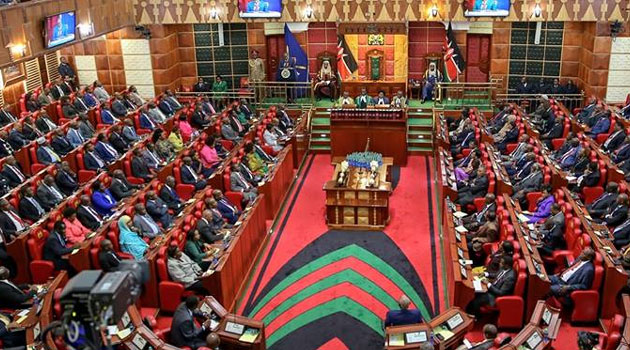
House Majority Leader Aden Duale said the ratification does not take away from Kenya’s economic role and obligations as a member of the East African Community/FILE
NAIROBI, Kenya, Sep 20 – National Assembly on Tuesday ratified the Economic Partnership Agreement under the Cotonou Protocol between Kenya and the European Union ahead of the October deadline.
House Majority Leader Aden Duale said the ratification does not take away from Kenya’s economic role and obligations as a member of the East African Community.
“This is the only option that Kenya has in order to save over Sh125bn EU export market, which has potential to be lost overnight if the ratification is not notified to the EU by September 30, 2016,” he said.
“Other negative ramifications to the economy that need to be avoided is threat of about 4million people working directly or indirectly with companies or ventures that are exporting to the EU, losing their livelihoods. Further, investments worth over Sh2bn in floriculture, horticulture, agro-processed products, fisheries, among others is also at stake, come October 21, 2016.”
Kenya and Rwanda on September 1 signed the Agreement with the EU but other EAC members such as Tanzania, Uganda, Burundi and South Sudan are yet to sign, which still poses a challenge of EAC actually enjoying the free market access in the EU.
He warned failure to ratify would have subjected tariffs to Kenya’s imports effective from January 18, 2017.
“Ratification, according to the EU roadmap, should be completed by October, 2016. The Agreement will enter into force when all the EU Member States and the EAC Partner States have deposited the instruments of ratification. However, there is a possibility to start implementing the agreement on provisional basis once it has been signed,” Duale told MPs
The other EAC partner states are considered Least Developed Countries (LDCs), hence they will continue to have free market access to the EU. An extra-ordinary EAC Heads of State meeting in Tanzania last week agreed to push the date forward for three months so as to give room for further discussions.
According to Industrialisation Cabinet Secretary Adan Mohammed the ratification has given Kenya a leeway to safeguard its exports from tariffs until the East African Community signs and ratifies on their part.
“The agreement was that Kenya was given until October 1, 2016 to have ratified its EPAs and would have ceased to be covered by the market access arrangement permitted under the regulation,” he explained during a news conference held at Ministry offices.
He said that the country will now forge into rallying other EAC members to sign and ratify the EPA.
Back to the debate in the National Assembly, House Finance Committee chairman Benjamin Langat and MPs David Ochieng (Ugenya), James Nyikal (Seme) and Johana Ngeno (Emurua-Dikirr) noted that the agreement was key to protecting the country from dumping of goods in the country and providing better trade deals between Kenya and the 28 member states in the EU including UK.
“Most of Kenya’s exports entered the EU market on duty free under this arrangement. The main objective of the preferential trade regime was to promote industrial development in the ACP countries. However, the preferential trade regime did not achieve its overall objective, since the share of Kenya’s exports in the EU market remained very low and scarcely diversified,” said Langat.
“The Business community needs to know the specific opportunities available for the various sectors as a result of signing the agreement. The challenges faced by the exporters to the European Union market need to be identified, and possible interventions to ameliorate the challenges proposed,” Ochieng said during his remarks in support of the Motion.
“The negotiated amendment clause provides flexibility to the Parties to seek for amendments on any provisions, including tariff liberalisation schedules, when need arises. The standstill provisions allow amendment of tariff liberalisation schedule under certain circumstances, such as to accommodate and foster the regional integration process,” Nyikal stated.
Minority Leader Francis Nyenze noted the EAC region should concentrate its efforts on consolidating our new customs union, as well as putting our energies into elaborating on and implementing carefully thought through and robust industrialization, agricultural and services strategies.
Muhoroni MP Onyango Koyoo who was the dissenting voice to the ratification motion, noted that EU will be able to monopolise our local markets in certain products, both within the EAC, and also in other African markets – who have also sign EPAs-, adding that the current rise in production and exports being witnessed in East Africa, will inevitably take a hard beating.
EPA gives preferential reciprocal access to a range of Kenyan agricultural goods and services to the European market making the produce competitive in the EU market.
The EPA negotiations begun in 2002 at the all-ACP Level. The substantive negotiations started in 2013 at the regional level. The negotiations were finalised in October 2014, with the initialling of the agreement to signify conclusion of the negotiations.
Trade between Kenya and the EU for over 30 years until December 31, 2007 has been conducted under a non reciprocal preferential trade regime under Lome Conventions (1975-2000) and later under the Cotonou Agreement (2000-2007).
The agreement provides for a comprehensive mandatory review of the entire agreement after every 5 years. The clause provides additional flexibility to the parties to amend any provisions which may pose challenges in the cause of implementation of the agreement, or in response to the changing circumstances.
The agreement provides for flexibility to the Parties to quit the agreement if they are not satisfied in the cause of the implementation. A one year notice is required in case of termination of the agreement.
(Kennedy Kangethe also contributed to this article)


































